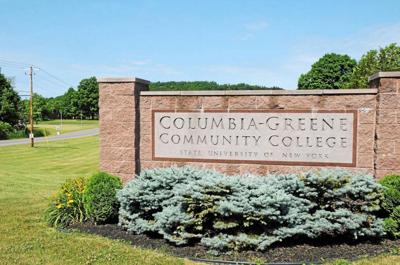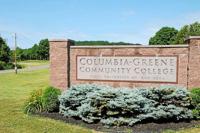ALBANY — Each of SUNY’s 64 campuses and universities will use state-approved pooled coronavirus testing as part of new requirements announced Friday to accurately identify new COVID-19 cases at state colleges, including asymptomatic carriers of the disease.
Upstate Medical University and SUNY Albany approved surveillance testing advancements that ensure enough COVID-19 testing capacity for each on-campus student every two weeks, or one virus incubation period, SUNY Chancellor Jim Malatras said Friday.
“Safely reopening colleges by containing COVID-19 so our students can have academic success is our top priority, and by launching immediate surveillance testing on every campus, we are giving ourselves the best shot to identify the presence of this virus before it can spread further across a campus, possibly infecting hundreds of students and forcing us to roll back the in-person offerings so many of our students find critical,” Malatras said in a statement Friday afternoon.
The SUNYwide requirement will ensure all on-campus students, faculty and staff on campus receive regular coronavirus diagnostic tests, which helps college and university officials and local public health officials identify, trace and quickly contain the virus.
“By installing regular surveillance testing of our on-campus population, we will be able to much better identify non-symptomatic carriers who otherwise may not have known to get tested,” Malatras said.
SUNY Upstate Medical University Interim President Dr. Mantosh Dewan said the Syracuse higher-learning institution and SUNY Albany’s RNA Institute provided research to expand rapid coronavirus testing capacity on state campuses, making pooled surveillance testing a reality.
“Keeping our students, campuses and communities safe is of the utmost importance, and SUNY Upstate Medical University is grateful to be a part of that process,” Dewan said.
Upstate Medical University personnel will continue to provide service and research to help manage the coronavirus as the pandemic continues, he added.
“The impact of their work is a testament to the true greatness that exists within this university system,” Malatras said. “I thank all of our college presidents for their leadership in getting this done.”
Last month, the state Health Department approved SUNY to undertake pooled COVID-19 surveillance testing — an innovative method that uses multiple saliva samples, allowing between 10 to 25 people to be screened as part of one diagnostic coronavirus test.
SUNY Upstate has worked with pooled testing at some state campuses since its approval.
“Pooled surveillance testing is a critical component of UAlbany’s multilayered approach to health and safety,” University at Albany President Havidán Rodríguez said in a statement. “We are fortunate that our outstanding researchers at the RNA Institute and School of Public Health scientists have led the development of a robust in-house testing program, in collaboration with nearly every division across the university, along with generous support from SEFCU, our community partner.”
University at Albany is administering an in-house pooled surveillance testing program developed by a team of UAlbany’s RNA Institute and School of Public Health scientists for the semester. The program was initially used to test asymptomatic students, faculty and staff in pools of four to help the campus monitor the presence of COVID-19.
The state Health Department approved the saliva diagnostic test Tuesday. The cost-effective and rapid screening can analyze more than 15,000 samples per day at SUNY Upstate’s Neuroscience Research Building in collaboration with Quadrant Biosciences — a Start-Up NY company supported by the state with key tax incentives, according to a statement from SUNY on Friday.
The testing can be done using saliva swabs rather than by swabs inserted in a person’s nose. Individuals administer the tests themselves, swabbing their mouths for 10 or 15 seconds each, and provide the saliva samples to staff to be sent to Upstate Medical.
The samples are combined into one, which is tested for the SARS-CoV-2 virus. A negative test means all 10 to 25 people in the group are presumed to be coronavirus-free.
A positive test for the pool would mean each individual saliva sample within the pool would be individually tested a second time to pinpoint exact positive cases.
The combination of surveillance pool testing and the saliva diagnostic testing enables the rapid retesting to occur without the need to collect a new sample, and thus provides the ability to rapidly screen more than 15,000 samples a day in a single lab, to identify the infected individuals, according to a statement Friday from SUNY.
Campus administrators statewide weighed in on the decision.
“In the interest of public health and safety for our college community, SUNY Geneseo recently announced our intention to conduct surveillance testing of students on our campus,” SUNY Geneseo President Denise Battles said. “We applaud Upstate Medical University’s innovative work to expand the availability of testing in our system and state.”
SUNY Potsdam President Kristin Esterberg said the college is prepared because of SUNY’s leadership and support from local public-health officials.
“We know that surveillance testing is key to stopping the spread of COVID-19 and maintaining the low numbers we have seen here in the North Country,” Esterberg said. “We will continue to follow the science and the real-time data to protect our campus and our community and surveillance testing is key to those efforts.”
SUNY Upstate Medical University tested about 6,000 SUNY Oswego students when they arrived to campus last month, campus President Deborah Stanley said.
“Upstate’s innovative pooled saliva testing allowed Oswego to meet our goal of screening students at the onset of the semester and establish a medical, scientific baseline for our campus,” she said. “We look forward to the continued partnership as we move forward with surveillance testing.”
Unlike some coronavirus diagnostic tests that have produced a wave of recent false-positive results, the state’s newly approved test exhibits markedly improved specificity in both individual and pooled saliva testing, according to SUNY.
“We have experienced first-hand the intrinsic value of the fast and efficient pooled-saliva testing at SUNY Canton,” President Zvi Safran said. “The expedited results provided by SUNY Upstate Medical has led to a greater sense of security within our college community. The State University of New York has made the best decision possible to implement surveillance testing across the SUNY System through this innovative method.
“Thank you for helping make our campuses safer places to learn and grow together.”
Buffalo State College President Katherine Conway-Turner is grateful for SUNY Upstate Medical University colleagues making pooled surveillance testing possible.
“Although New York state has become the nation’s leader in reducing the infection rate of COVID-19, we cannot let our guard down,” Turner said. “Surveillance testing will allow us [to] act early and isolate any positive cases that are discovered. We continue to urge all Bengals — on and off campus — to be New York Tough and do their part to keep our community safe. Wash your hands, avoid large gatherings and wear your mask. We are in this together.”
More than 415,500 students were enrolled in a degree-granting program at a SUNY campus as of fall 2019. SUNY serves about 1.3 million students in credit-bearing courses and programs, continuing education and community outreach programs. SUNY research expenditures systemwide exceeded $1.7 billion in fiscal year 2019, including significant contributions from students and faculty.









